Clifford Garstang's Blog, page 19
March 16, 2022
Regal House Authors at AWP

The conference of the Association of Writers and Writing Programs (AWP) is right around the corner and I’ll be heading up to Philadelphia for a few days.
Among other things, I’ll be joining several other Regal House Publishing authors at a two-night event at the Barnes & Noble Rittenhouse Square for readings and book-signings. I’ll be doing a brief reading at 5:30 pm on Friday, March 25, but my book Oliver’s Travels will be available at the store any time. I hope to see you there!
We’ll be giving away some Barnes & Noble gift certificates and other great prizes, so please come and check us out.
March 7, 2022
I’ve Got Questions for Alex Poppe
Editor’s Note: This exchange is part of a series of brief interviews with emerging writers of recent or forthcoming books. If you enjoyed it, please visit other interviews in the I’ve Got Questions feature.
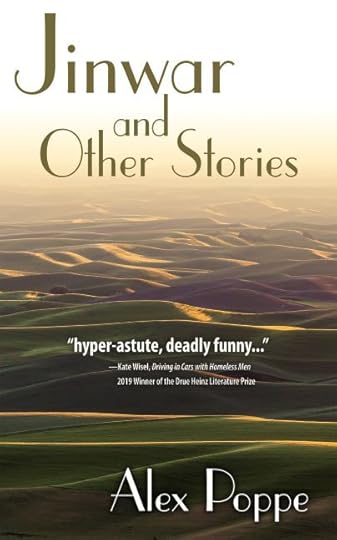 Jinwar and Other Stories by Alex PoppeWhat’s the title of your book? Fiction? Nonfiction? Poetry? Who is the publisher and what’s the publication date?
Jinwar and Other Stories by Alex PoppeWhat’s the title of your book? Fiction? Nonfiction? Poetry? Who is the publisher and what’s the publication date?My book is called Jinwar and Other Stories, published by Cune Press. It will be released on March 8, 2022, to coincide with International Women’s Day. This is a collection of short stories.
In a couple of sentences, what’s the book about?The characters in Jinwar and Other Stories celebrate the fragile grandeur of living an independent life in the aftermath of violence. Deeply rooted in place, these stories are about identity, hope, and redemption as fierce and flawed women rebuild their lives in the wake of war. The young women sparking through these pages are surprising, funny, and devastating: the essence of womanhood. Timely and prescient, Jinwar and Other Stories is the collection for a #YesAllWomen world.
What’s the book’s genre (for fiction and nonfiction) or primary style (for poetry)?Literary Fiction; Short Stories, Women’s Fiction, World Literature, Middle East Literature
What’s the nicest thing anyone has said about the book so far?Drue Heinz award-winning author Kate Wisel said, “This is one hyper-astute, deadly funny, entirely consequential collection.”
What book or books is yours comparable to or a cross between? [Is your book like Moby Dick or maybe it’s more like Frankenstein meets Peter Pan?]If my short story collection were a painting, it would be a mural by Diego Rivera because the collection slants a satirical, sly eye on difficult, social justice realities. The stories hang together to paint a picture of what life is like for a daisy chain of women living in the Middle East. I create from research; working from real events, so in that respect, the collection is like Margaret Atwood’s The Handmaid’s Tale. The collection is varied, so individual stories are comparable to specific works of fiction. For example, the title novella “Jinwar” is comparable to War Porn. “Road Trip in War Time” is comparable to The Vanishing Half. “Ras Al-Amud” is similar to Girl at War.
Why this book? Why now?I write fiction to reflect the world in which we live, with the hope of spurring the conversations necessary to promote social change. Our world is still desperately unequal due to patriarchy and is overtly violent due to imperial misadventures. The voices of the women in these stories ring out, revealing the hypocrisy of those still in power, and underscoring the importance of women having autonomy over their bodies and their lives. I want my writing to show the beauty in the ugly of living, the moments of triumph and resilience within despair.
Other than writing this book, what’s the best job you’ve ever had?I really enjoyed my life as an actor in New York, and after, my time abroad, teaching and volunteering in the humanitarian aid sector. I am very blessed to have taught in post-conflict zones such as the West Bank and northern Iraq, and to have trained teachers for the Ministry of Higher Education in Baghdad and for the US Department of State in Panama. These experiences helped me understand privilege, hegemonic legacy, and the myth of American exceptionalism.
What do you want readers to take away from the book?Because I fictionalize from research or lived experience, most of the events in the collection have happened to real people. I hope to humanize a world that many readers know only from commercial news clips and movies. I hope the reader sees that under utter desolation, laughter is possible, and there is the possibility of redemption.
What food and/or music do you associate with the book?In the section of “Jinwar” when the narrator, a survivor of rape in the military, is working in a hotdog truck shaped like a penis during the Kavanaugh hearings, I had a lot of fun describing all the disgusting details of food cart service. I can’t eat hotdogs now because the narrator observes cockroaches swarming in meat casings, tied off in the shape of a cat’s butthole.
What book(s) are you reading currently?I am currently reading Wayward, A Little Devil in America, The Dispossessed, and Ordinary Girls. I have just finished Great Circle, whose characters have stuck with me.
 Alex Poppe
Alex PoppeLearn more about Alex on her website.
Follow her on LinkedIn.
Buy the book from the publisher (Cune Press), Amazon, or Bookshop.org.
Register for her virtual book launch hosted by Women & Children First Bookstore on Wednesday, March 9 at 7 pm CT.
March 1, 2022
2022 Reading–February
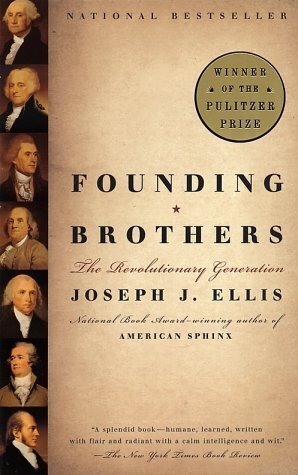
Founding Brothers: The Revolutionary Generation by Joseph J. Ellis is a history book (and Winner of the Pulitzer Prize for History in 2001) that I’ve had for a long time and finally got around to reading (because a local bookstore was hosting a discussion of it). It’s very readable and takes an unusual approach to history by focusing less on events than on relationships. It begins with an account of the Hamilton-Burr feud (and the duel that resulted in Hamilton’s death). It then looks at an earlier dinner that Thomas Jefferson supposedly hosted between Hamilton and James Madison, the result of which was an important policy compromise. And so on, concluding with the troubled friendship between John Adams and Jefferson that apparently mended itself after Jefferson left the Presidency. Ironically, the two men died on the same day, July 4, 1826.

All That She Carried by Tiya Miles was my book club’s selection for this month. I have mixed feelings about this book. On the one hand, it tells a compelling story about slavery, and if you haven’t read about the horrors of slavery in the US it is a good place to start. (We don’t need to teach “CRT”–just assign a couple of books like this and people will get the idea of how badly slaves were treated by whites.) On the other hand, if you have read about slavery, as most educated people have, this book adds only some texture to the story–the interesting detail of how enslaved women might value needlework in some kind of coping mechanism. But what I found lacking in the book is that its central narrative revolves around speculation. As much as the author tried to get concrete evidence of who the main players in the story were and what happened to them, that evidence is mostly lacking. As a result, much of the story is a work of the author’s imagination. It could have been done this way, for this reason, etc. It’s all plausible, but not really history. And yet the book won the National Book Award.
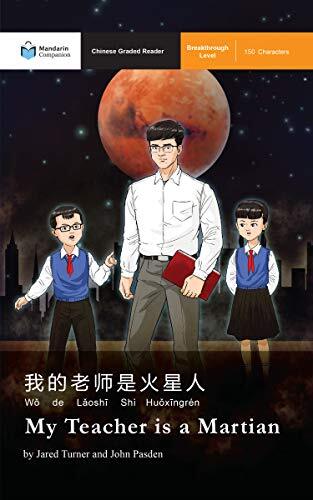
My Teacher is a Martian by Jared Turner and John Pasden is a book in Chinese written at a very elementary level (a “Graded Reader”). Although my knowledge of Chinese is more advanced than required for this book, I don’t do a lot of reading in Chinese and decided it would be good practice. I’ve read another of the books in the “breakthrough” level of the Mandarin Companion series and most of one in Level 2, so I think I’ll move on to Level 1 before resuming work on the Level 2 books. This story is fun–two young students become interested in the stars and jump to the conclusion that their teacher is from Mars, so they set about trying to learn the truth. Given that only 150 characters are used, there is a lot of repetition, which can be a little tedious. For example, the two kids have names made up of three characters, and after a while I ignored the names because they were used in full many times in each paragraph. Good practice, I suppose, for learning to read a little faster.
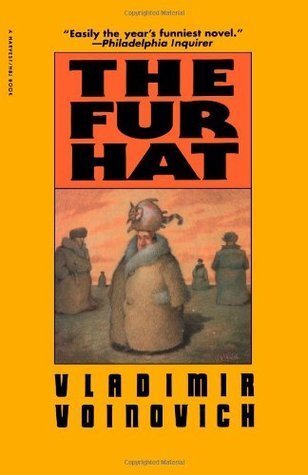
The Fur Hat by Vladimir Voinovich was first published in 1989 but for some reason I was given a copy of it last year. The author is an exile from the Soviet Union and the book is a bizarre satire of life there, focusing on a particular writer. The writer in question is an unobjectionable sort who writes nothing controversial and has published eleven books about “decent people,” as he insists. When the writers’ union to which he belongs announces plans to distribute fur hats to writers, he knows that he will be given an inferior hat because he is held in low esteem. In fact, it turns out they plan to give him a hat made from house cat fur, not even rabbit fur, and this sends him over the edge. The satire is marked with humor but also a serious critique of the USSR and anti-semitism.
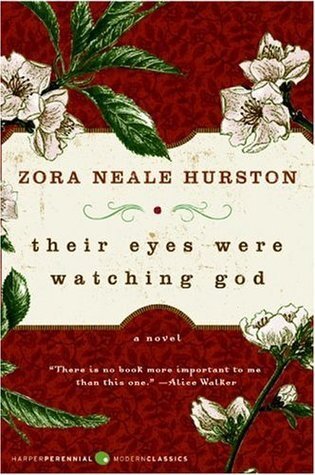
Their Eyes Were Watching God by Zora Neal Hurston is a remarkable piece of writing with dialogue in dialect that can be difficult to read on the page. Fortunately, I also had the audio book (narrated brilliantly by Ruby Dee), so that helped, and in fact that was my primary text. This is the story of Janie who has returned “home” after being away for some time, and her friend Phoeby questions her about all the rumors the other women have been spreading her. So Janie tells her the story of her life—the early part of which Phoeby presumably already knows, because it happened before they met—including what happened when she ran off with a younger man, Tea Cake. That is the part of the story that becomes very exciting, as she and Tea Cake have quite a life in the Everglades.

Win Me Something by Kyle Lucia Wu is one of the novels for the panel I am moderating at the Virginia Festival of the Book in March. The theme of the panel is an exploration of what family is, and this book certainly fits the theme. The narrator is Willa Chen, a young bi-racial woman who is recounting her year as a nanny for a nine-year-old girl whose wealthy family lives in Tribeca in New York City. Willa feels almost but not quite part of this girl’s family and becomes attached, which is understandable because she feels unattached from her own family—divorced parents who have remarried and started second families. There’s no plot to speak of here, but Willa’s internal struggles as she reflects on the meaning of family are engaging.
February 8, 2022
I’ve Got Questions for Melanie Faith
Editor’s Note: This exchange is part of a series of brief interviews with emerging writers of recent or forthcoming books. If you enjoyed it, please visit other interviews in the I’ve Got Questions feature.
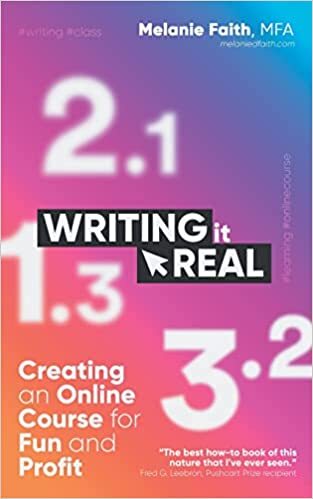 Writing it Real: Creating an Online Course for Fun and Profit by Melanie FaithWhat’s the title of your book? Fiction? Nonfiction? Poetry? Who is the publisher and what’s the publication date?
Writing it Real: Creating an Online Course for Fun and Profit by Melanie FaithWhat’s the title of your book? Fiction? Nonfiction? Poetry? Who is the publisher and what’s the publication date? My book is a nonfiction craft book called Writing It Real: Creating an Online Course for Fun and Profit. Vine Leaves Press is my awesome publisher. My book’s publication date is February 8, 2022. (This book is part of a craft series, with the next book in the serious releasing in April about how to write a reference book that sells and which is available now for preorder.)
In a couple of sentences, what’s the book about?My book is a teaching craft book with down-to-earth writing craft advice and humorous anecdotes with practical exercises included. It offers insights into creating, teaching, and launching a vibrant online writing class. Whether you’re just getting started on your teaching journey or if you’ve taught for years in a brick-and-mortar classroom and would like to make the leap into online instruction, this book offers insight into topics such as: choosing your class theme or genre, determining target audience, choosing the length and platform of your class, tips for what to charge, determining objectives, creating a syllabus, marketing your class, interviews with experienced online teachers, and so much more! It has an easy-to-navigate chapter format, making it a snap for instructors to skim the Table of Contents to find handy topics at a glance or to read it chronologically from start to finish.
What’s the book’s genre (for fiction and nonfiction) or primary style (for poetry)?My book is nonfiction and filled with exercises, a sample syllabus, a self-quest survey about your teaching strengths, and a resources list to inspire instructors of all writing-class genres, class sizes, and skill levels.
What’s the nicest thing anyone has said about the book so far?“The best how-to book of this nature that I’ve ever seen! Comprehensive, inclusive, thoughtful and all offered with a terrific sense of humor and constant empathy. A must-have for any writer seeking to set up an online creative writing class!” –Fred G. Leebron, Director of Writing Programs in Charlotte, Roanoke, Gettysburg, and Latin America, and Pushcart Prize and O. Henry Award Recipient
I had tears of joy in my eyes when I read this blurb from Fred, whose amazing writing and leadership as Director of Writing Programs at Queens University in Charlotte made a huge impact on me while I was a grad student at Queens as well as afterwards and who is a writer and educator I greatly respect.
What book or books is yours comparable to or a cross between? [Is your book like Moby Dick or maybe it’s more like Frankenstein meets Peter Pan?]My book is a cross between Sage Cohen’s Fierce on the Page: Become the Writer You Were Meant to Be and Succeed on Your Own Terms, Natalie Goldberg’s Writing Down the Bones: Freeing the Writer Within, and Elizabeth Gilbert’s Big Magic: Creative Living Beyond Fear, with a dollop of Rebecca Stobaugh’s Fifty Strategies to Boost Cognitive Engagement: Creating a Thinking Culture in the Classroom for good measure. My book has a great blend of imagination alongside practical teaching and writing tips to support and inspire creative writers who enjoy sharing their knowledge with fellow scribes while staying refreshed enough to power through the rigors of teaching online (just like with all teaching in any format, there are some challenges as well as joys, and I have a chapter near the beginning of the book that outlines numerous pros and cons to consider).
Why this book? Why now?I’ve been interested in online education long before becoming an online educator. I’ve written other craft books about writing that were also published by Vine Leaves Press (about flash fiction and nonfiction, poetry, and photography), and I very much wanted to write more craft books about other topics, this time combining my love for the arts of teaching and writing into a single book.
With our current technological boom, the power of education and the creative arts to reach all ages, socioeconomic and education ranges, and skill levels has never been more life-affirming and life-changing. In my online teaching practice, for example, I teach a beautiful array of writers ages 14 through their 80s, who live across the US and in countries across the world and/or who are active-duty or retired military. I’ve experienced first-hand the leaps and bounds of writing growth students can make with an engaging class topic and format and the technological tools that connect them with classmates and teachers who are also vibrant artists. Teaching and/or taking online classes is a splendid way to create community together, grow one’s writing, and to make strong friendships.
Also, the Covid-19 pandemic has led even more writing programs to offer additional online classes as well as encouraging more writers that freelance teaching and/or mentoring online through their own website or other platform is a meaningful and flexible part-time job opportunity that they’d like to try. Freelance teaching is an area of teaching online that is sometimes forgotten but can be a lucrative and great way to break into online teaching, too.
Plus, most days, teaching online is quite fun. I get to talk about writing and books with smart, well-read fellow writers. #dreamgig
Other than writing this book, what’s the best job you’ve ever had?The jobs I have now as online educator and editor tie for the best jobs I’ve ever had. Both jobs have expanded my social circle (I’m an introvert, but not in my classroom or in my inbox), put my English degrees to work in a dynamic way, and give me the opportunity to read and give feedback on the work of talented writers who are also passionate about language and story and are walking the writing path just as I am. Talk about motivating!
I also love getting to know my writing students and clients as individuals working towards their writing and/or publication goals as well as experiencing the atmosphere of each class and independent study I teach. No two semesters at my jobs—even no two days—are ever alike in my schedule. Variety is good and keeps my mind and heart awake to potential in other writers as well as within myself and my writing.
What do you want readers to take away from the book?I want readers to walk away from reading my book knowing that teaching an online course is within their wheelhouse—if you want to teach online, there are myriad ways to make it happen. You can do it. I want them to feel jazzed and excited about the kind(s) of classes they can craft and the students whose lives they will impact by sharing what they know. I want them feel confident that they know the practical steps and also have creativity they will use after completing the exercises and self-quiz in the book to launch their own classes and/or to apply to teach at an online school or program. Also, that teaching online is flexible, individual, diverse, fun, challenging, and very fulfilling for teachers and students alike.
What food and/or music do you associate with the book?I wrote much of this book in 2020 and 2021 during the pandemic, so there was a lot of food involved, since eating was one consistent daily joy in the midst of much of everything else being topsy-turvy. There was a particularly decadent chocolate cake with whipped-cream frosting garnished with cookie crumbles that accompanied me during many writing sessions. There were also a lot of cooking shows and comedies on cable and streaming that got me through and made me laugh and see some lighter sides of a very dark time and kept me writing ever-forward.
What book(s) are you reading currently?I’m in the middle of A.R. Ammons’ Tape for the Turn of the Year, which is a 200+ page poem written (quite extraordinarily) on a roll of adding-machine tape in 1963-1964, and I just finished Get Started in Writing Historical Fiction, a craft book by Emma Darwin, that I recommend and read in preparation for a new historical fiction and time-travel story-writing class I’ll teach online later this year. For a book club my sister and I formed, I’m reading a page-turner, My Dear Hamilton: A Novel of Eliza Schuyler Hamilton by Stephanie Dray & Laura Kamoie. I also have some graphic novels from a manga series on the wobbly stack beside my filled bookshelves that I look forward to reading soon.
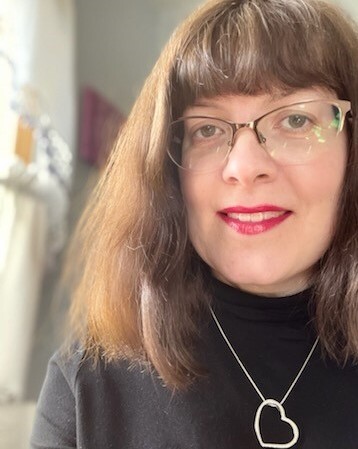 Melanie Faith
Melanie FaithLearn more about Melanie on her website.
Follow her on Twitter and Instagram
Buy the book from the publisher (Vine Leaves Press), Amazon, or Bookshop.org.
February 7, 2022
I’ve Got Questions for Shirley Reva Vernick
Editor’s Note: This exchange is part of a series of brief interviews with emerging writers of recent or forthcoming books. If you enjoyed it, please visit other interviews in the I’ve Got Questions feature.
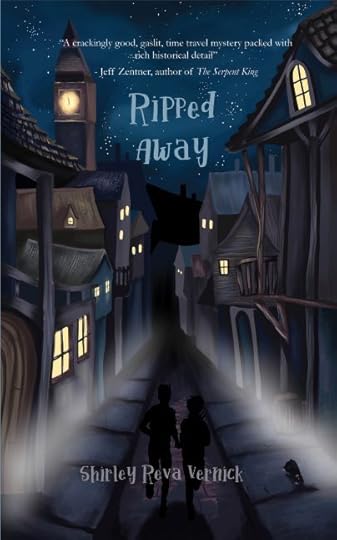 Ripped Away by Shirley Reva VernickWhat’s the title of your book? Fiction? Nonfiction? Poetry? Who is the publisher and what’s the publication date?
Ripped Away by Shirley Reva VernickWhat’s the title of your book? Fiction? Nonfiction? Poetry? Who is the publisher and what’s the publication date?My novel is Ripped Away, published by the Fitzroy imprint of Regal House Publishing, release date February 8, 2022.
In a couple of sentences, what’s the book about?Ripped Away explores the real experiences of Jewish refugees in London during the Jack the Ripper hysteria. A fortune teller sends Abe and Mitzy through time and space to the London tenements in the midst of the Ripper spree. To get back home, they’ll have to save a life and survive the antisemitic xenophobia that the Ripper murders sparked. Along the way, young love may bloom.
What’s the book’s genre (for fiction and nonfiction) or primary style (for poetry)?This is a time-slip novel geared for middle-grade and early YA readers.
What’s the nicest thing anyone has said about the book so far?“Ripped Away is a rare, eye-opening novel that seamlessly blends fantasy, contemporary and historical fiction to illuminate the challenges teens face today and the horrors of the little-known blood libel brought upon London’s East End Jews during the time of Jack the Ripper. It’s a bold story few of us would ever know without Vernick’s meticulous research, masterful storytelling, and her fierce determination to share truth and make sure that antisemitism is not omitted or erased from that history.” ~ Liza Wiemer, author of The Assignment, a 2021 Sydney Taylor Notable YA novel and 2021 YALSA Best Fiction for Young Adults nominee.
What book or books is yours comparable to or a cross between? [Is your book like Moby Dick or maybe it’s more like Frankenstein meets Peter Pan?]Ripped Away is like When You Reach Me (Rebecca Stead) meets 11/22/63 (Stephen King).
Why this book? Why now?Intolerance is rampant in our country and in the wider world. I wanted to write a compellingly entertaining story, based on true events, that would illustrate the dangers of bigotry and xenophobia.
Other than writing this book, what’s the best job you’ve ever had?I mentor aspiring novelists who are currently serving prison sentences. These individuals are motivated to tell stories that can both captivate and inspire future readers, and it’s an honor to be part of their process.
What do you want readers to take away from the book?I want two things. I want readers to think, “Wow, great story!” Secondly, I hope readers will be moved to avoid pointing fingers, in the absence of evidence, when something bad happens.
What food and/or music do you associate with the book?I think about simple Jewish food like herring and dark bread, which, incidentally, I was raised on. For music, I keep hearing that old Animals song “We Gotta Get Out of this Place.”
What book(s) are you reading currently?I like to alternate between fiction and nonfiction. Currently, I’m reading the novel The World Before Us by Aislinn Hunter. Next up is the science book The Soul of an Octopus – A Surprising Exploration into the Wonder of Consciousness.
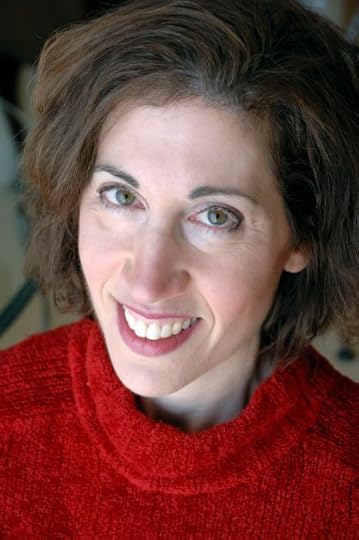 Shirley Reva Vernick
Shirley Reva VernickLearn more about Shirley at her website.
Follow her on Twitter, Instagram, and Facebook
Buy the book from the publisher (Regal House Publishing), Amazon, or Bookshop.org.
February 1, 2022
Happy New Year!
 Celebrate Year of the Tiger 2022 with papercutting gold colored tiger on the plum blossom background, the circle Chinese stamp means tiger and the vertical Chinese stamp means year of the tiger according to lunar calendar system
Celebrate Year of the Tiger 2022 with papercutting gold colored tiger on the plum blossom background, the circle Chinese stamp means tiger and the vertical Chinese stamp means year of the tiger according to lunar calendar system
January 31, 2022
2022 Reading–January
Starting the year off big:
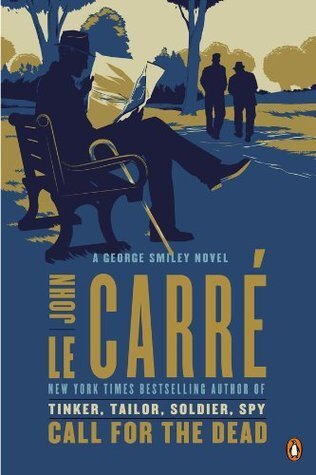 Call for the Dead by John LeCarre
Call for the Dead by John LeCarreCall for the Dead by John le Carré is the first George Smiley book and le Carré’s first novel. The audio book does not include the introduction by le Carré that describes how he came to be a spy novelist, but the kindle version did. A prologue-like first chapter describes Smiley’s background and some of the influences on his actions and beliefs, a bit like a character sketch an author might create for his own purposes but not share with readers. In any case, Smiley, working in “Security,” interviews a foreign office employee who has been denounced in an anonymous letter. Next day, that employee commits suicide. Or does he? Smiley doesn’t think so, and so he investigates, even resigning his position to do so. It’s an engaging story, even if a little clunky at times.
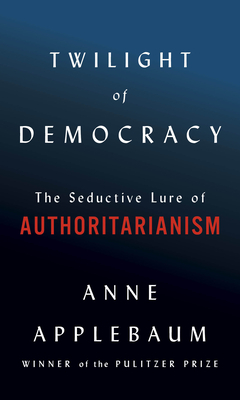 Twilight of Democracy by Anne Applebaum
Twilight of Democracy by Anne ApplebaumTwilight of Democracy: The Seductive Lure of Authoritarianism by Anne Applebaum was my book club’s selection for this month, and I thought it was brilliant. Married to a Polish diplomat, Applebaum is particularly familiar with the situation in Poland, but also knows well other European nations including Hungary, which seems to have moved the farthest right of any countries on the continent. The analysis is first-rate, in my opinion, and beautifully written. She spends less time than I might have liked on the situation in America, but maybe we all know that story too well. And while the European cases are frightening, she might also have drawn on examples from South America and Asia.
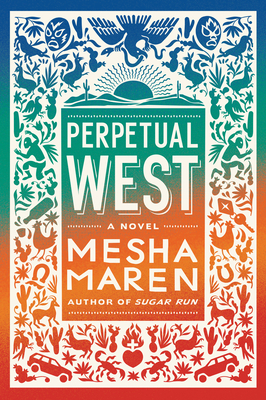 Perpetual West by Mesha Maren
Perpetual West by Mesha MarenPerpetual West by Mesha Maren is a novel that addresses a lot of themes, some of which I tried to touch on in my review in the New York Journal of Books. The main characters are Elana and Alex, a young couple who move from Virginia to El Paso, Texas at the beginning of the book. Alex, who was raised by an evangelist Christians in West Virginia, is drawn to the area because he was adopted from the Mexican border city of Juaréz, and as a sociology graduate student he’s interested in studying border cultures. He’s also escaping his parents’ strictures, however, and begins to explore his homosexual urges. Elana is also escaping a difficult family situation—her drug-addicted brother attempted to kill their father—and sinks into anorexia with little direction in her life. Ultimately the book is her story, as she begins to search for Alex after he disappears, presumably in Mexico. The pace of the novel picks up when Elana begins her search, but until then it drags somewhat while we struggle to understand what Alex and his lover, a Mexican Lucha Libre wrestler who is, reluctantly, employed by the boss of a Mexican drug cartel.
 A Husband and Wife are One Satan by Jeff Fearnside
A Husband and Wife are One Satan by Jeff FearnsideA Husband and Wife are One Satan by Jeff Fearnside is a chapbook of short stories set in Kazakhstan. We published the title story in the very first volume of Everywhere Stories: Short Fiction from a Small Planet (Press 53, 2014). As a Peace Corps Volunteer in Kazakhstan, Jeff got to know the country very well, and I got a taste of it myself when I worked there as a consultant back in the 1990s. The chapbook is only 40 pages long, but the five stories are excellent. They are told from varying points of view and all manage to reveal interesting aspects of the history and culture of the country. If you have any interest in Central Asia, this would be a great read. My full review is available at PeaceCorpsWorldWide.org.
 Treasure of the Blue Whale by Steven Mayfield
Treasure of the Blue Whale by Steven MayfieldTreasure of the Blue Whale by Steven Mayfield is a charming novel told from the point of view of an old man recalling an incident from the summer of 1934 when he was ten years old. He finds a mass of ambergris on the beach—the first chapter, in something of a prologue, explains how it came to be—and the town stands to be very wealthy with this discovery when the boy opts to share his good fortune. There are, of course, complications, but along the way we meet a fascinating cast of characters. It’s a very enjoyable book.
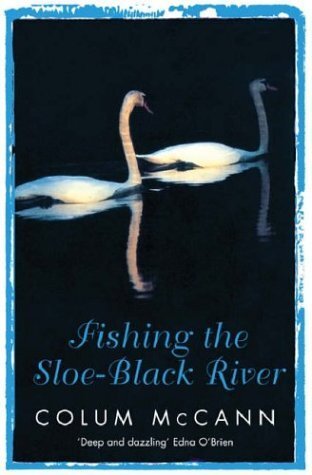 Fishing the Sloe-Black River by Colum McCann
Fishing the Sloe-Black River by Colum McCannFishing the Sloe-Black River by Colum McCann is a collection of short stories and McCann’s first book. I’d been meaning to read it for some time, and just came across so finally cracked it open. Damn, but he’s such a fine writer, and there’s a terrific variety here. The characters are Irish, many who have found their way to other countries—the U.S. mostly—but some who have stayed. There’s a bleakness about the stories, too—the lack of opportunity for the ones who stayed, and the struggles for the one’s who managed to leave.
 Half by Sharon Harrigan
Half by Sharon HarriganHalf by Sharon Harrigan is an excellent book about twins who grow up in Michigan with an overbearing father they come to hate. Eventually, when they go off to college, they manage to avoid seeing him, coming home to visit their mother only when they know he’ll be away. The twins remain close to each other, though, speaking daily, more or less reading each other’s minds, even as their careers pull them apart. We know from the very beginning that they have come home for their father’s funeral, and eventually most of what they thought they knew begins to unravel.
Shadow Dance by Martin Ott is a forthcoming novel in a genre that one might call LA Noir. The main character, Buddy Rivet, is AWOL after a tour in Afghanistan where he got into some trouble. Arriving home in Louisiana, the other LA, he discovers that his erstwhile girlfriend has spent the money he’s been sending her on a trailer in her name and on top of that she’s sleeping with his sleazy uncle. So he moves on to Los Angeles to find his childhood friend Solomon because he thinks his friend needs help. Indeed, the friend is involved with a family that is into a lot of nasty business. Buddy, taking the name West, finds himself sucked into their world. Meanwhile, he wonders whatever happened to his parents who went missing after some scam they pulled back in Louisiana. He believes they’re still alive and sets about to find them, which reminds me some of The Family Fang. Look for this one in 2023. (I was asked to provide a blurb for this book, which is why I’ve read it so far in advance of publication.)
January 16, 2022
I’ve Got Questions for Heather Newton
Editor’s Note: This exchange is part of a series of brief interviews with emerging writers of recent or forthcoming books. If you enjoyed it, please visit other interviews in the I’ve Got Questions feature.
 McMullen Circle by Heather NewtonWhat’s the title of your book? Fiction? Nonfiction? Poetry? Who is the publisher and what’s the publication date?
McMullen Circle by Heather NewtonWhat’s the title of your book? Fiction? Nonfiction? Poetry? Who is the publisher and what’s the publication date?McMullen Circle; Fiction: Linked Stories; Regal House Publishing; Pub date 1/17/22.
In a couple of sentences, what’s the book about?In 1969, as Karl Wallenda prepares to tightrope walk across the gorge in the tiny town of Tonola Falls, Georgia, faculty families at the McMullen Boarding School learn about war, racism, and what makes a hero.
What’s the book’s genre (for fiction and nonfiction) or primary style (for poetry)?Literary fiction.
What’s the nicest thing anyone has said about the book so far?“These deeply literary, heartfelt, and heartbreaking characters call to mind the work of Elizabeth Strout, Gail Godwin, and Richard Russo, but Heather Newton is her own writer. Her characters are shot through with longing and hope, and in this small community we watch as big dreams and big desires are dreamed and felt, run toward and away from. This is the kind of book that readers return to to re-immerse themselves in Newton’s world, and it’s also the kind of book that writers return to to see how she pulled it off.” -Wiley Cash, New York Times bestselling author of A Land More Kind Than Home
What book or books is yours comparable to or a cross between? [Is your book like Moby Dick or maybe it’s more like Frankenstein meets Peter Pan?]Olive Kitteridge meets Moonrise Kingdom.
Why this book? Why now?Linked stories are perfect for a pandemic. Distracted readers can consume a bit at a time but still enjoy the satisfying arc of a novel.
Other than writing this book, what’s the best job you’ve ever had?Camp counselor for musical theater kids.
What do you want readers to take away from the book?I hope I capture this particular time and place, and get readers thinking about what has and has not changed in 50+ years.
What food and/or music do you associate with the book?Frozen hotdogs and Brunswick Stew.
What book(s) are you reading currently?The Good Luck Stone by Heather Bell Adams, and Screenplay: The Foundations of Screenwriting by Syd Field.
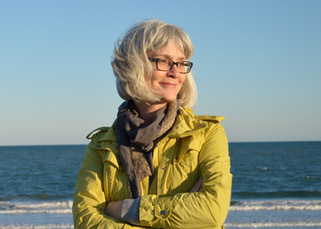
Learn more about Heather at her website.
Follow her on Facebook and Twitter
Buy the book from the publisher (Regal House Publishing), Malaprops Books, or Bookshop.org.
January 14, 2022
I’ve Got Questions for Michael G. Lewis
Editor’s Note: This exchange is part of a series of brief interviews with emerging writers of recent or forthcoming books. If you enjoyed it, please visit other interviews in the I’ve Got Questions feature.
 Fight Like A GirlWhat’s the title of your book? Fiction? Nonfiction? Poetry? Who is the publisher and what’s the publication date?
Fight Like A GirlWhat’s the title of your book? Fiction? Nonfiction? Poetry? Who is the publisher and what’s the publication date?Fight Like A Girl, is a nonfiction, historical compilation of 25 of the toughest female warriors in history. It’s published by Regal House and the official launch date is January 15th 2022.
In a couple of sentences, what’s the book about?Women have been successfully fighting in combat roles since the beginning of time. Their exploits are tragic, triumphant, awe-inspiring, and even humorous. But their stories are relatively unknown. These women warriors—these “Band of Sisters,” as it were—had far-reaching effects on the entire world, and their stories deserve to be told.
What’s the book’s genre (for fiction and nonfiction) or primary style (for poetry)?Fight Like A Girl is my foray out of children’s picture books and into the Middle-Grade historical nonfiction genre.
What’s the nicest thing anyone has said about the book so far?Boston Globe: “In lively prose, and beautifully illustrated by Hila Ronis, Lewis shows the courage, resourcefulness, and leadership of these remarkable women.”
Midwest Book Review: “Fight Like a Girl is inspiring nonfiction reading and a fine survey of relatively unknown women whose efforts changed their world. It deserves to be in any middle-grade collection seeking to put the roles and achievements of women in their proper place in history.”
Why this book? Why now?Any time should be a good time to recognize the kind of awe-inspiring achievements these women accomplished – and the impact they had on the world – but now, more than ever, it seems especially timely to have these amazing historical figures thrust into the spotlight.
Other than writing this book, what’s the best job you’ve ever had?Working as a production assistant for Warner Bros. and having the immense pleasure of working – albeit, far too infrequently – as an actor on television; most notably with Art Carney and Audrey Meadows of “The Honeymooners” fame.
What do you want readers to take away from the book?A large receipt showing the purchase of several copies.
What food and/or music do you associate with the book?Interesting question, as I’m a huge foodie. Given the diversity of the characters that are showcased in the book, I’m happy to report that perusing Fight Like A Girl will likely conjure up a wide range of international food delicacies and an equally satisfying catalogue of musical tastes and genres.
What book(s) are you reading currently?I’m a financial advisor for Northwestern Mutual, and thoroughly enjoy reading about retirement planning, wealth creation, wealth protection, and estate planning. As a result, I’m usually leaving a trail of related reading material all over my house.
For pleasure, I’m just wrapping up The Devil In The White City by Erik Larson
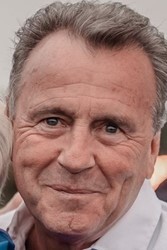 Michael G. Lewis
Michael G. LewisLearn more about Michael at his website.
Buy the book from the publisher (Regal House/Fitzroy Books), Amazon, Barnes & Noble, or Bookshop.org
January 11, 2022
I’ve Got Questions for Leah Angstman
Editor’s Note: This exchange is part of a series of brief interviews with emerging writers of recent or forthcoming books. If you enjoyed it, please visit other interviews in the I’ve Got Questions feature.
 Out Front the Following Sea by Leah AngstmanWhat’s the title of your book? Fiction? Nonfiction? Poetry? Who is the publisher and what’s the publication date?
Out Front the Following Sea by Leah AngstmanWhat’s the title of your book? Fiction? Nonfiction? Poetry? Who is the publisher and what’s the publication date?My book has the tongue-twister of a title Out Front the Following Sea. It’s my debut novel, being published by Regal House Publishing on January 11, 2022.
In a couple of sentences, what’s the book about?Only a couple sentences? Can we get a longer elevator ride? No? Then, here goes: It’s a historical epic of one headstrong Englishwoman’s struggle to survive in the brutal wilds of 17th-century New England, where she’s been branded a witch and forced to escape the only town she’s ever known. When tensions arise between English and French settlers during King William’s War, she must save her treasonous Frenchman from the noose and reckon with all the townsfolk, Pequot Indians, highwaymen, soldiers, Quakers, pirates, and witch-hunters she’s dragged into the fray.
What’s the book’s genre (for fiction and nonfiction) or primary style (for poetry)?My novel is a highly poetic literary historical epic, though I’ve seen it fall under categories for “adventure” and “literary thriller,” as well. It’s a lot of things in one violent, lovely package.
What’s the nicest thing anyone has said about the book so far?She’s been called “Stunning” and “Masterfully crafted” by Readers’ Favorite, which is pretty awesome, and I’m thrilled that half of my 5-star reviews on Goodreads start with “Wow!” That makes me pretty tickled. I loved Jason Denness’ review that said, “Angstman likes to go beyond what a lot of authors will do; some will create characters that will break your heart … with Angstman, it feels like she has reached into your chest to remove your heart and breaks it in front of you.” I’ve also had one person tell me he missed his bus stop and one person tell me she missed her Zoom meeting because my book was so engrossing—those are pretty rad compliments.
But probably Ethel Rohan’s blurb, which brings me to tears, is the one I return to: “An absorbing, painstakingly researched read that, like the sea itself, mirrors the beauty, cruelty, enormity, baseness, and wonder of human nature. It is chilling that Angstman’s debut novel set in 17th-century New England captures the horrors that continue to plague contemporary America, particularly with regard to imperialism and patriarchy. It is heart-swelling that, in these pages and in life, the best of humankind resists and endures. I’ll remember this book as a historical tale woven with wry humor, striking detail, lush prose, daring characters, and a belief in glorious possibilities.”
What book or books is yours comparable to or a cross between? [Is your book like Moby Dick or maybe it’s more like Frankenstein meets Peter Pan?]I don’t know any other book quite like it. It’s closest to The Witch of Blackbird Pond meets Beheld, but with the poeticism of Cormac McCarthy, the brutality of Jack London, the epic detail of James Clavell’s Tai-Pan, the purple prose of Melville, the seafaring journey of the Master and Commander series, and the action-adventure of Bernard Cornwell. Reviews have compared it to Lalita Tademy, Sara Donati, and Delia Owens.
Why this book? Why now?The 1600s in America fascinates me to no end, and one of its most fascinating features is how much it mirrors today. Despite colonists pooping in chamber pots, dying from relatively mundane disorders, and not knowing any world outside their mile-wide bubble, misogyny and the patriarchy were fierce; and women, Native Americans, and enslaved people had to fight for every scrap they got. Flash forward to 2022, and we’re still fighting imperialism, racism, and misogyny, and refusing to learn a lot of lessons we should have paid attention to.
Why now? Because now, as much as ever, we need to see how history treated women and how they rose above it. In the era of #MeToo and #BelieveWomen and #TimesUp, we need to read story after story after story of how women have persevered through the patriarchy for centuries despite the odds. And we need to stop romanticizing history—it’s ugly, it has harsh truths, it’s all kinds of gray shades, it holds no heroes. The strength of my story is in its controversies, in how uncomfortable it will make you, in how it forces you to face the terrifying time that was the 1600s without allowing you the solace of rose-colored glasses. And yet, if you’re a close reader, you’ll see the flickers of hope that get us through our everyday lives and always have—the flickers of hope we need so desperately right now, as we venture very dangerously into a failing future.
Other than writing this book, what’s the best job you’ve ever had?I’ve never had a job I loved (and if we’re being honest here, I don’t even love writing, to quote Dorothy Parker: “I hate writing; I love having written”), though I’ve had some interesting ones. The “best” in terms of money was bartending in Boston on a Friday night. I suppose the most rewarding is running Alternating Current Press, though there’s little thanks in it, and moneywise, it barely breaks even. And I liked the prestige of being Arts & Entertainment Editor and Managing Editor of my local newspapers back in the day—though it was a lot of late nights and tediously tiny print in a time when newspaper type was still all laid out by hand.
What do you want readers to take away from the book?I’d love for them to walk away having new notions about the 17th-century, that it’s not some stodgy old “simpler times” story that wholesome people want to feed you. It was dangerous and difficult and a special kind of feat to stay alive. I want readers to lose their preconceived notions of the time period and become immersed in something thrilling and uncertain. I want readers to know it’s okay to take the journey, to have your heart broken, to confront the ugliness even if it makes you uncomfortable, and I want them to remain stuck in this world that they didn’t expect, long after they’ve closed the covers. I want readers to discover the overlooked and underappreciated 1600s for the first time, and get bit by the research bug to go searching for more discoveries.
What food and/or music do you associate with the book?If you ask me, I get all the feels from some good Zeal & Ardor dark-gospel rock, but in reality, it would’ve been stringy baroque music, Anglo church hymns, grog, buttered rum, port wine, aqua vitae, and boiled everything. Blargh.
What book(s) are you reading currently?For research, I’m reading The British Are Coming: The War for America, Lexington to Princeton, 1775-1777 by Rick Atkinson for a novella about the skirmish of Lexington I’m polishing, and Suzanne M. Desan’s Living the French Revolution and the Age of Napoleon for my War of 1812 trilogy that I recently started writing. For fun, I’m loving Jennifer Fliss’ The Predatory Animal Ball and crying over Shaindel Beers’ Secure Your Own Mask.
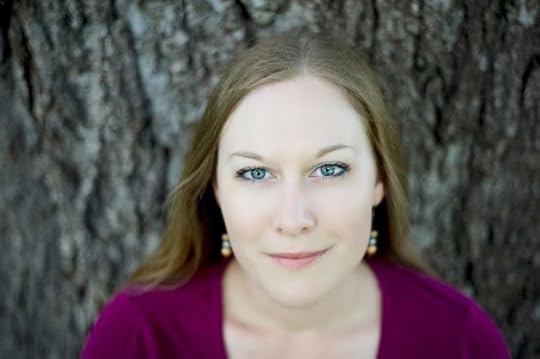 Leah Angstman
Leah AngstmanLearn more about Leah at her website.
Follow her on Amazon, Facebook, Twitter, and Instagram.
Buy the book from the publisher (Regal House Publishing), Amazon, or Bookshop.org.



